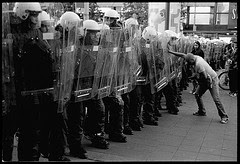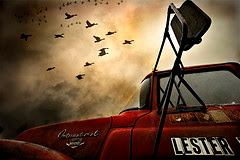This week I launched the use of a digital visualizer in the classroom in conjunction with a new class website...The response has been overwhelming. 125 students, give or take, have signed my guestbook and the students have even voted in our own Presidential Straw poll (Barack Obama & Mike Huckabee are the class leaders respectively). After three days of toggling back and forth between the visualizer & eUniverse I decided to crack our textbooks back open. While all of the students were diligently completing vocabulary & questions about the American banking system and the FDIC, an exclamation arose from the crowd. "Mr. Anderson! My textbook has black mold in it! Gross!" Even though freshman can be known to exaggerate, it was anything but. Sure enough, mold spores had taken hold in the 10-year text. Bewildered and a little embarassed I started thinking...
What if we closed our textbooks and started opening their minds?
The idealist in me saw a vision of Robin Williams in his 1950s prep classroom in "Dead Poet's Society" tearing out the literature book pages. It warmed my heart. When I recovered my senses the following hour (the same course, different class) I apologized to my students. I told them that yes textbooks serve a purpose as backbones for our curriculum, but I assured them that until further notice, not a book would be cracked without a dire need for it.
Have you ever seen a deer in headlights? How about at 70 MPH? That is what these Social Studies freshman looked like. Just then, for that split second, they were mine...And that is where the learning began. We slammed our books on the ground (WE DID NOT TEAR OUT PAGES) and turned on the visualizer. We found our answers, only this time, they were seeking them instead of copying them. On the e-Universe we searched & Googled & traversed from one economic indicator site to the next and back again. We stumbled upon the "Death and Taxes" website featuring President Bush's budget plan for 2008. They were amazed with a few things: First, the amount spent on the military in proportion to other government funded services. Second, they were appalled with the spending on education (HA!). And third, they actually started asking questions like "Why do we spend $15 billion on farm subsidies" and "How come we only spend $1.25 billion on alternative energy research?".
Imagine students asking cerebral questions about our economy. It was a relevation.
Thursday, November 29, 2007
Subscribe to:
Post Comments (Atom)




No comments:
Post a Comment